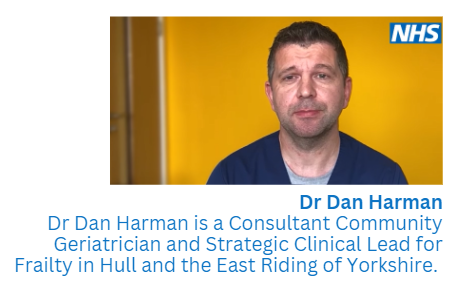Integrated healthcare transforms care for frail and elderly
Blog

Consultant Community Geriatrician Dr Dan Harman has been closely involved in developing the frailty pathway at Jean Bishop Integrated Care Centre (ICC), an innovative healthcare service designed to meet the needs of people in Hull and East Yorkshire living with frailty.
In his blog Dr Harman explains how health, social care and other professionals at the Jean Bishop centre work closely to provide person-focused care for its mainly elderly patients. This integrated approach also alleviates pressure on the local healthcare system, and supports the NHS Long Term Plan Ageing Well agenda.
“In 2018 we developed an anticipatory care model that would see GP practices across the city of Hull identifying patients at risk of severe frailty, using the Electronic Frailty Index, and referring people to the Jean Bishop centre for a comprehensive geriatric assessment. The centre aims to take a different approach against an historic background of poor health and social care outcomes of residents with frailty.
“A number of workstreams are provided at Jean Bishop ICC, each aligned to the Ageing Well agenda. A patient will see a geriatrician or GP with an extended role in frailty, or an advanced nurse practitioner. They may also see the medicines management team, a pharmacist or pharmacy technician, and a member of the social care team. They’re encouraged to attend with a carer so we can carry out an assessment of carer need through our carer support information service. The patient with frailty may also receive therapy from occupational therapy and physiotherapy services.
“A multi-disciplinary meeting will agree a care plan, shared with the the patient, their GP and the hospital. This Integrated Care Centre recommendation letter states the health issues the centre has tried to address and what the actions are to remedy these.
“Patients feel included in their care, understand and know what might happen next. The healthcare system benefits, too, are significant – as a result of patients going through an anticipatory care model such as this we can demonstrate a sustained reduction in unnecessary emergency department attendances and primary care attendances.
“Equity and parity of service are also important. There are 6,500 care homes residents across Hull and East Riding and it’s really important such residents are offered the same level of specialist care as patients who reside in their own home.
“On any given day the roles of our clinicians can be quite varied. They can be delivering anticipatory care in the Jean Bishop centre, or in a care home setting, caring for patients in our community intermediate care rehabilitation beds, or delivering an urgent community response.
“An individual with frailty may have episodes of crisis that need an urgent care response. We now deliver an urgent community response (UCR) 7 days a week, 12 hours a day that’s aligned to the anticipatory care model. The Covid-19 pandemic gave us an opportunity to trial elements of the UCR which forms part of the Ageing Well agenda. We can provide that reactive response that is required in the community setting, while emphasising the importance of keeping the person in their preferred place of care, whether it be at home or in a community rehabilitation bed.
“The next exciting piece of the jigsaw will be the development of virtual wards. Starting this December we’ll be delivering the Frailty Hospital at Home Virtual Wards for the whole of Hull and East Riding which is an exciting opportunity for our team to provide that wrap-around care, linking together the anticipatory and reactive care that’s often required for people living with frailty.
“The emphasis is on allowing people to be cared for in their preferred place of care – which is really exciting if you consider there are 200 care homes across Hull and East Riding and thousands of residents living with frailty across the whole of our area. We feel we’re in a really good place to deliver this because we’ve got the skills of delivering the urgent community response and the anticipatory care agenda. We see the virtual wards as a real next step for us towards providing that right level of care for people in a community setting.”
